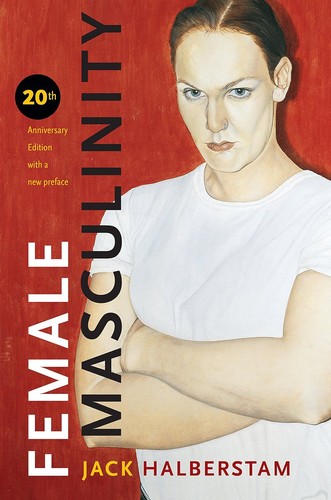ralentina reviewed Female Masculinity by Jack Halberstam
Academia ruining lesbian aliens for us all, since 1998
4 stars
Female Masculinity has become a classic, the kind of book that gets reprinted for its 20th anniversary, with a new preface. And yet, somehow the notion of female masculinity still remains relatively marginal and provocative, certainly in the mainstream, but even within queer circles. At least, this is how it feels to me, even as a (somewhat) masculine woman. What does it mean for women to express masculinity in ways that are original rather than derivative? How does the category of 'masculine' reshuffles division between, on the one hand, dykes and straight (masculine) women and, on the other hand, dykes and trans men? What are the politics of performing masculinity, vs rejecting any stable gender position, vs becoming male? and are these even political practices, or expressions of some inner identity, or both?
Halberstam explores these questions by analysising different cultural artefacts: artistic photos of butches and trans people, the notes of 19th century doctors and therapists, the writings of John Radclyffe Hall, and his friends and lovers, Stone Butch Blues, the (mostly academic) clashes between dykes and female-to-male trans theorists, drag king performances, and films representing masculine women.
The main weakness of the book is, in my opinion, that Halberstam loves to pick fights with other scholars. In some cases, he clearly has no respect of his adversaries and their ideas, which he represents so sweepingly as to lose the reader's trust (example: 'white lesbian feminism', never defined, and at points seemingly encompassing - or 'brainwashing' even Audrey Lorde). In other cases, he is very sensitive and self-questioning (example: the mailinglist controversies around F2M) - which obviously is a better premise for thinking. In all cases, however, the meaningfulness of his reflections risks getting lost in the squabble.
Stylistically, I understand this is an academic product, but I do find it a bit of a shame that the book isn't written in a slightly more engaging way: Halberstam never abandons his rigorous scholarly register, though he cannot help soften a bit in his scholarly exegesis of Flaming Ears.
All in all, the book made me think of masculinity in a whole new way, but even I find myself thinking: wow, this is a bit navel-gazing, let's stop thinking about gender and burn down a bank instead.

